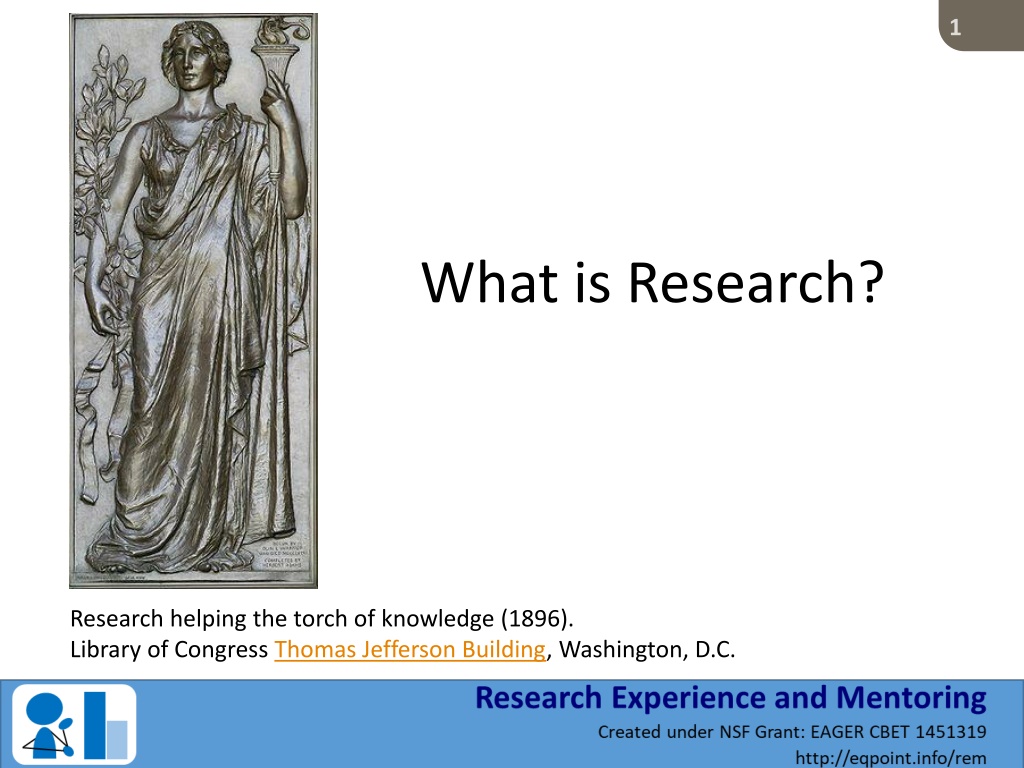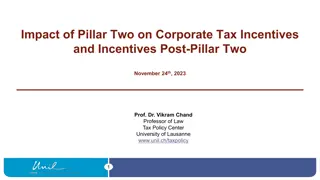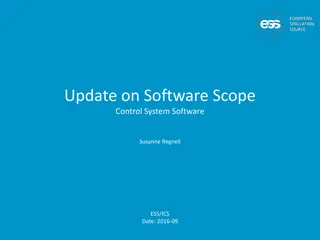Understanding the Essence of Research: Types, Scope, and Impact
Research is the systematic pursuit of knowledge aimed at enhancing understanding and contributing to generalizable knowledge. It encompasses basic and applied research, experimental development, and investigation of various phenomena. This process is essential for innovation, problem-solving, and the advancement of society as a whole.
Download Presentation

Please find below an Image/Link to download the presentation.
The content on the website is provided AS IS for your information and personal use only. It may not be sold, licensed, or shared on other websites without obtaining consent from the author. Download presentation by click this link. If you encounter any issues during the download, it is possible that the publisher has removed the file from their server.
E N D
Presentation Transcript
http://upload.wikimedia.org/wikipedia/commons/thumb/7/7b/Research-Warner-Highsmith.jpeg/220px-Research-Warner-Highsmith.jpeghttp://upload.wikimedia.org/wikipedia/commons/thumb/7/7b/Research-Warner-Highsmith.jpeg/220px-Research-Warner-Highsmith.jpeg 1 What is Research? Research helping the torch of knowledge (1896). Library of Congress Thomas Jefferson Building, Washington, D.C.
2 Defining Research The search for knowledge or any systematic investigation to establish facts [1] Scholarly or scientific investigation or inquiry [2] Research means a systematic investigation, including research development, testing and evaluation, designed to develop or contribute to generalizable knowledge.[3]
3 Types of Research Basic Research Acquire new knowledge of the underlying foundation of phenomena and observable facts Not directed to particular application or use Applied Research Original investigation to acquire new knowledge Directed primarily towards a specific practical aim Experimental Development Systematic work, drawing on existing knowledge gained from research and/or practical experience, which is Directed to producing new materials, products or devices, to installing new processes, systems and services, or to improving substantially those already produced or installed. 1. Frascati Manual: http://browse.oecdbookshop.org/oecd/pdfs/browseit/9202081E.PDF
4 Types of Research
5 Scope of Research
6 Research as a Process Who Sponsors Research ? What Does Research Produce? Research Inputs Outputs Patents New Knowledge Products Money Ideas Needs Companies Universities Government Labs Private Labs Individuals Who Performs Research ?
7 Who Sponsors Research ? Who Sponsors Research ? What Does Research Produce? Research Inputs Outputs Patents New Knowledge Products Money Ideas Needs Companies Universities Government Labs Private Labs Individuals Who Performs Research ?
8 Why is Research Funded ? Governments - basic research is presumed to be a "public good" whose benefits are shared by all. Governments companies won t fund basic research because it would be shared with competitors Companies gain competitive edge Companies develop new products Individuals intellectual curiosity Foundations solve specific problem/disease Governments - science is so expensive that private funding is insufficient. Governments - training
9 Who Sponsors Research ? Worldwide Research Funding by PPP Amount
10 Who Sponsors Research ? Worldwide Research Funding by % GDP
11 Who Sponsors Research ? US Research Funding by Source of Funds
12 Who Sponsors Research ? US Research Funding % by Source of Funds
13 Who Sponsors Research ? US Government Research Funding George Bush President 2001-2009 The Space Race Sputnik 1 satellite October 1957 Ronald Reagan President 1981-1989
14 Who Performs Research ? Who Sponsors Research ? What Does Research Produce? Research Inputs Outputs Patents New Knowledge Products Money Ideas Needs Companies Universities Government Labs Private Labs Individuals Who Performs Research ?
15 Who Performs Research? R&D by Performing Sector
16 Who Performs Research? 2009
17 Who Performs Research?
18 Who Performs Research? University Research Funding
19 Who Performs Research ?
20 Who Performs Research? Number of Researchers
21 What Does Research Produce ? Who Sponsors Research ? What Does Research Produce? Research Inputs Outputs Patents New Knowledge Products Money Ideas Needs Companies Universities Government Labs Private Labs Individuals Who Performs Research ?
22 What Does Research Produce ? Patents
23 What Does Research Produce ? Patents
24 What Does Research Produce ? New Knowledge
25 Should Government Sponsor Research ? By US to improve the US Outputs Research By Britain to improve Britain By Germany to improve Germany
26 Should Government Sponsor Research ? The Economic Laws of Scientific Research by Terence Kealey published in1997 Free market approach rather than that of state funding has proved by far the most successful in stimulating science and innovation.
27 Should Government Sponsor Research ? In the nineteenth century, British science received almost no government support Britain grew into the richest and most industrialized country in the world, Produced scientists such as Davy, Kelvin, Maxwell, Lyell and Darwin. At the same time, France and Germany, whose governments did fund science expansively, trailed behind.
28 Should Government Sponsor Research ? Comparing the Roman Empire with the dark ages that followed its dissolution, When commerce was under state control under the Romans technical innovation stagnated. During the dark ages, when government was weak, all the great inventions that set the stage for the industrial revolution occurred: the saddle, the stirrup, the horseshoe, the horse collar, the tandem harness, the water mill, the crank and several others.
29 Should Government Sponsor Research ? Review of institutions that produce the largest numbers of cited papers in biology, of the top seven Two were private companies One was a charity Three were private institutions (though these now receive government grants) Only one was a wholly government-founded, government-funded laboratory, the Institut de Chimie Biologique in Strasbourg
30 Should Government Sponsor Research ? Hasn't government funding of science produced all kinds of advancements in technology? What about the internet? the various benefits of NASA and the Defense Department? Response: All of these benefits have been produced through very inefficient means. Private sector firms somehow manage to generate scientific discoveries at a far greater rate than the governments of the world despite having much less money.
31 Should Government Sponsor Research ? Myth: basic science is essential for technological advance (it is sometimes essential [electromagnetism] science learns from technology [thermodynamics and steam engines]); that science is essential for economic growth (technology is, science isn t); and most striking of all, that government supports more science than the private sector would if left to itself. By comparing different countries, he shows that the larger the fraction of civil science supported by government the smaller the fraction of GDP devoted to science4. A dollar of public investment in science seems to displace more than a dollar of private investment.
32 Who Sponsors Research ? US Government Research Funding 2009
33 Should Government Sponsor Research ? Companies are motivated to do basic research Only highly skilled research scientists can capture other people's science. The best scientists are those who are actually doing research,. To retain their services, companies have to fund them with considerable generosity and considerable freedom. Thus we see that "capture" is the solution to, not the problem of, the industrial exploitation of pure research.
34 Should Government Sponsor Research ? Most of the benefits of a company's basic science are indeed "captured" by competitors. Example 10 largest Japanese pharmaceutical companies, $13 billion revenue Each company had an annual return of 19% on its own investment in research Each company obtained the equivalent of a 33% annual return on the R&D done by the other nine companies. Each company was, therefore, apparently free riding on the other nine.
35 Conclusion We are engaged in the research enterprise























